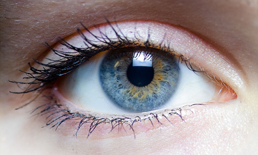Medical Roundup
New research lends clues to why a bad sunburn hurts so much.

A hormone called ghrelin is a key part of how stress triggers mice to seek out fatty food.

THE SCIENCE OF FACES: when pigeons look at us, and the genes behind how we look at faces. Also: what causes hot flashes, determining your age from your DNA, and the hormone behind stress eating.
A new study suggests that babies exposed to pets in the home are less likely to develop allergies to them.

A failing grade for fat substitutes, a master regulator gene for fat, a brainwave that helps control memory, and turning skin cells into brain cells.

The genes behind unfaithful finches, mapping the diversity of bird plumage colors, what feathers can tell us about pollution, and what baby birds drink. Also: could living with a dog or cat decrease a child's risk of developing allergies?
A “master regulator” gene in fat tissue may affect diabetes, cholesterol, obesity, and other conditions.

What reindeer can see that we can't. How some blind people are using echolocation to navigate the world. And, how the retinas of deaf people change their experience of the world. Also: better noses spelled bigger brains for ancient mammals, and: what the teeth of Neanderthals tell us about their hands.

Why sleep deprivation clouds thinking, what the brainwaves of sleeping teenagers reveal, and how a video game helps sick kids strengthen their lungs. Also, why a team of epidemiological sleuths invaded school graduations across Maryland last year. And, new study reveals extreme gender bias in children’s books.
Scientists have extinguished, or at least greatly weakened, a long-term memory in a sea snail.

The soaring price of gold drives deforestation in the Amazon, colonoscopies laced with gold could help detect cancer, and honey protects against antibiotic resistance. Also: a starless starfish, and a jellyfish that navigates without a brain.
Researchers have identified the region of the brain responsible for humiliation.

Researchers erase sea snail memories, the brain's sarcasm detector, why a lack of embarrassment could be a sign of dementia, and schizophrenia in a petri dish.
Researchers have re-created dysfunctional brain cells from the skin of a schizophrenic patient.
